- Home
- Bill Bryson
Bryson's Dictionary For Writers And Editors (v5.0) Page 4
Bryson's Dictionary For Writers And Editors (v5.0) Read online
Page 4
Bartók, Béla. (1881-1945) Hungarian pianist and composer.
Bartolommeo, Fra. (1475-1517) Florentine painter.
Basel, Basle, Bâle. Third-largest city in Switzerland. Basel is the usual spelling in the United States and Germany; Basle is the usual spelling in Switzerland and Britain; Bâle is the usual spelling among French speakers.
Baasescu, Traian. (1951–) President of Romania (2004–).
Bashkortostan. Russian republic.
BASIC. Short for Beginner’s All-purpose Symbolic Instruction Code; computer programming language.
basically. The trouble with this word, basically, is that it is almost always unnecessary.
Basilicata. Region of Italy.
basis. More often than not, a reliable indicator of wordiness, as here: “Det. Chief Supt. Peter Topping…said he would review the search on a day-to-day basis.” Why not make it “would review the search daily” and save five words?
Basotho. The people of Lesotho.
bas-relief.
Basse-Normandie. Region of France; capital Caen.
Basseterre. Capital of St. Kitts and Nevis.
basset hound.
Bastille Day. July 14 (1789).
Bataan. Peninsula of the Philippines, famous for a long forced march of defeated Allied soldiers by Japanese in which many thousands died in World War II.
bated breath, not baited. Bated is a cousin of abated and so implies something that is withheld.
bathos. From the Greek bathus, meaning “deep,” bathos can be used to indicate the lowest point or nadir, or triteness and insincerity. But its usual use is in describing an abrupt descent from an elevated position to the commonplace. It is not the opposite of pathos, which has to do with feelings of pity or sympathy.
Bathsheba. In the Old Testament, the wife of Uriah and then David, and mother of Solomon.
bathyscaph. Research submarine.
battalion.
Battelle Memorial Institute, Columbus, Ohio.
Baudelaire, Charles (Pierre). (1821-1867) French poet.
Baudouin I, (Albert Charles Léopold Axel Marie Gustave). (1930-1993) King of the Belgians (1951-1993).
Bauhaus. German school of arts and architecture, founded by Walter Gropius (1883-1969).
Baum, L(yman) Frank. (1856-1919) American writer of children’s stories; created The Wonderful Wizard of Oz.
Bausch & Lomb. Eye-care company.
Bayern. German for Bavaria.
Bayonne. Name of cities in France and New Jersey.
Bayreuth, Bavaria.
BC always goes after the year (e.g., 42 BC); usually set in small caps. See also AD.
BCE. Before the Christian era.
be (with a participle). Almost always a wordy way of getting your point across, as here: “He will be joining the board of directors in March.” Quicker to say, “He will join the board of directors in March.”
Beachy Head, East Sussex, England.
Beardsley, Aubrey. (1872-1898) British artist.
béarnaise sauce.
Beaufort, South Carolina; pronounced bew-furt.
Beaufort scale. Measures wind velocity on a scale of 0 to 12, with 0 representing dead calm and 12 representing a hurricane.
Beaujolais. French region and wine.
Beaumarchais, Pierre Augustin Caron de. (1732-1799) French playwright whose works inspired The Barber of Seville and The Marriage of Figaro.
beau monde. (Fr.) The fashionable world; pl. beaux mondes.
Beauregard, Pierre (Gustave Toutant de). (1818-1893) Confederate general in the Civil War.
Beauvoir, Simone (Lucie Ernestine Marie Bertrand) de. (1908-1986) French author.
beaux arts. (Fr.) The fine arts.
béchamel sauce.
Becher’s Brook. Celebrated jump on English Grand National horse racing course.
Bechuanaland. Former name of Botswana.
Becket, St. Thomas (à). (1118-1170) Archbishop of Canterbury, murdered by followers of Henry II.
Beckett, Samuel. (1906-1989) Irish poet, playwright, and novelist.
becquerel. Unit of radioactivity, named after Antoine Henri Becquerel (1852-1908), French physicist.
Bedloe’s Island. Former name of Liberty Island, New York; site of the Statue of Liberty.
bedouin is plural; the singular is bedi. Bedu is an alternative plural.
Beecher, Henry Ward. (1813-1887) American preacher.
Beelzebub. Satan.
Beene, Geoffrey. (1927-2004) American fashion designer.
Beerbohm, Sir (Henry) Max(imilian). (1872-1956) British writer and critic.
Beethoven, Ludwig van. (1770-1827) German composer.
before, prior to. There is no difference between these two except length and a certain inescapable affectedness on the part of prior to. To paraphrase Theodore Bernstein, if you would use “posterior to” instead of “after,” then by all means use “prior to” instead of “before.”
Beggar’s Opera, The. Not Beggars’; by John Gay (1728).
Begin, Menachem. (1913-1992) Polish-born Israeli prime minister (1977-83); Nobel Peace Prize shared with Anwar el-Sadat (1978).
behalf. A useful distinction exists between on behalf of and in behalf of. The first means acting as a representative, as when a lawyer enters a plea on behalf of a client, and often denotes a formal relationship. In behalf of indicates a closer or more sympathetic role and means acting as a friend or defender. “I spoke on your behalf” means that I represented you when you were absent. “I spoke in your behalf” means that I supported you or defended you.
Behn, Aphra. (1640-1689) English writer.
behoove (British behove). An archaic word, but still sometimes a useful one. Two points need to be made:
1. The word means necessary or contingent, but is sometimes wrongly used for “becomes,” particularly with the adverb ill, as in “It ill behooves any man responsible for policy to think how best to make political propaganda” (cited by Gowers).
2. It should be used only impassively and with the subject it. “The circumstances behoove us to take action” is wrong. Make it instead “It behooves us in the circumstances to take action.”
Beiderbecke, Bix. (1903-1931) Jazz musician; born Leon Bismarck Beiderbecke.
Beijing (Pinyin)/Peking.
Bekaa Valley, Lebanon.
Belarussian (or Belarusian) for someone or something from Belarus. The language is also Belarussian.
beleaguered. Not -ured.
Belém. Brazilian city, formerly Pará.
Belize. Central American republic, formerly British Honduras.
Belknap Press, The. Part of Harvard University Press.
belladonna. A highly toxic perennial herbaceous plant.
belle époque. (No caps.) The period just before World War I.
Belleisle, County Fermanagh, Northern Ireland, and New Brunswick, Canada; Belle-Île, Brittany, France; Belle Isle, Florida; Strait of Belle Isle, Newfoundland, Canada.
Bellerophon. In Greek mythology, a warrior who killed the Chimera and was crippled trying to fly Pegasus over Mount Olympus.
belles-lettres. Writing that has a literary or aesthetic, as opposed to purely informational, value. The word is usually treated as a plural, but may be used as a singular. For reasons unconnected to logic, the hyphen is lost and the word itself contracted in the related terms belletrist, belletrism, and belletristic.
bellicose. Warlike.
bellwether. Not -weather. Wether is an Old English word for a castrated sheep. A bellwether is a sheep that has a bell hung from its neck, by which means it leads the herd from one pasture to another. In general use, it signifies something that leads or shows the way. A bellwether stock is one that is customarily at the head of the pack. It does not mean a harbinger or foreteller of events.
Belsen. Concentration camp in Lower Saxony, Germany, during World War II, full name Bergen-Belsen.
beluga is a type of sturgeon, and not a manufacturer or producer of caviar, as i
s sometimes thought, so the word should not be capitalized (except of course at the start of a sentence).
Ben Ali, Zine El Abidine. (1936–) President of Tunisia (1987–).
Bendl, Karel. (1838-1897) Czech composer.
Benedick. Character in Much Ado About Nothing by William Shakespeare.
beneficence.
Benelux. Short for Belgium, Netherlands, and Luxembourg.
Beneš, Eduard. (1884-1948) Czechoslovakian prime minister (1921–1922) and president (1935-1938, 1939-1945 [in exile], and 1945-1948).
Benét, Stephen Vincent. (1898-1943) American writer, brother of William Rose Benét (1886-1950), also a writer.
Benghazi. Libyan city.
Ben-Gurion, David. (1886-1973) Israeli prime minister (1948-1953, 1955-1963); born David Grün.
benignancy/benignity.
Bening, Annette. (1958–) American actress.
benison. A blessing.
Bentsen, Lloyd. (1921-2006) American Democratic politician, secretary of the treasury (1993-1994); ran as vice presidential candidate in 1988.
ben venuto. (It.) “Welcome.”
benzene, benzine. Both are liquid hydrocarbons commonly used as solvents. Benzene is primarily associated with the production of plastics, while benzine most often is encountered as a solvent used in dry-cleaning establishments. At all events, they are quite different substances and not merely alternative spellings of a single compound.
Beograd. Serbian for Belgrade.
Beowulf. Not -wolf. Anglo-Saxon epic.
Berchtesgaden. Not -garden. Bavarian tourist center where Hitler had a country retreat.
bereft. To be bereft of something is not to lack it but to be dispossessed of it, to lose it. A spinster is not bereft of a husband, but a widow is. (The word is the past participle of bereave.)
Bérégovoy, Pierre. (1925-1993) Prime minister of France (1992-1993).
Berenson, Bernard (or Bernhard). (1865-1959) Lithuanian-born American art critic.
Beretta. Italian manufacturer of handguns.
Bergdorf Goodman. New York department store.
Berkeleian. Of or from the philosophy of George Berkeley (1685–1753).
Berkeley, California, and Berkeley Square, London. The latter is pronounced bark-lee.
Berkeley, Busby. (1895-1976) Hollywood choreographer.
berkelium. Chemical element.
Berklee Performance Center, Boston, Massachusetts.
Bermudan. Not -ian.
Bern is the normal English spelling for the capital of Switzerland, though Berne is also accepted.
Bernabéu Stadium. In Madrid (formally Santiago Bernabéu Stadium), home of Real Madrid.
Bernanke, Ben. (1953–) American economist, chairman of the U.S. Federal Reserve Board (2006–).
Bernhardt, Sarah. (1844-1923) French actress, called “the Divine Sarah” born Henriette-Rosine Bernard.
Bernini, (Giovanni) Lorenzo. (1598-1680) Italian sculptor and architect.
Bertelsmann. German media group.
Bertolucci, Bernardo. (1940–) Italian film director.
beryllium. Chemical element.
beseech.
besides means “also” or “in addition to,” not “alternatively.” Partridge cites this incorrect use: “The wound must have been made by something besides the handle of the gear-level.” Make it “other than.”
besiege. Not -ei-.
Bessarabia. Former name of Moldova.
Bessemer process. Steelmaking method named after Sir Henry Bessemer (1813-1898), British metallurgist.
bestseller, bestsellerdom (one word), but best-selling (hyphen).
Betelgeuse. Star in Orion constellation.
bête noire. (Fr.) Something much disliked; pl. bêtes noires.
Bettelheim, Bruno. (1903-1990) Austrian-born American child psychologist.
bettor for one who bets.
between, among. A few authorities continue to insist that between applies to two things only and among to more than two, so that we should speak of dividing some money between the two of us but among the four of us. That is useful advice as far as it goes, but it doesn’t always go very far. It would be absurd, for instance, to say that Chicago is among New York, Los Angeles, and Houston. More logically, between should be applied to reciprocal arrangements (a treaty between the United States, the United Kingdom, and Canada) and among to collective arrangements (trade talks among the members of the European Union).
between you and I is always wrong. Make it “between you and me.” The object of a preposition should always be in the accusative. More simply, we don’t say “between you and I” for the same reason that we don’t say “give that book to I.”
Bevan, Aneurin (1897-1960), but Ernest Bevin (1881-1951) for the British politicians.
Bhagavadgita. Sacred Hindu text, part of the Sanskrit epic Mahabharata.
Bhumibol (Adulyadej). (1927–) King of Thailand (1946–).
Bhutan. Asian kingdom; capital Thimphu. Natives are Bhutanese (sing. and pl.).
biannual, biennial. Biannual means twice a year; biennial means every two years.
biased.
biathlon for the sport in which competitors ski across country and shoot set targets.
Bible (cap.), but biblical (no cap.).
Big Ben, strictly speaking, is not the famous clock on the Houses of Parliament in London, but just the great hour bell, so a passing visitor will hear Big Ben but never see it. The formal name of the clock, for what it is worth, is the clock on St. Stephen’s Tower on the Palace of Westminster.
bildungsroman. (Ger.) Novel dealing with a character’s early life and psychological development.
Biletnikoff, Fred. (1943–) Football player. The Biletnikoff Award is named for him.
billabong. Australian backwater; literally “dead stream.”
billet-doux. (Fr.) Love letter; pl. billets-doux.
Billingsgate. For the historic London fish market; when lowercased it denotes foul or abusive speech of the type once heard there.
bimonthly, biweekly, and similar designations are almost always ambiguous. It is far better to say “every two months,” “twice a month,” etc., as appropriate.
biriani (or biryani). Indian meat and rice dish.
Bishkek. Capital of Kyrgyzstan.
Bishopsgate, London.
Bismarck, Prince Otto (Eduard Leopold) von. (1815-1898) German chancellor (1871-90).
bivouac, bivouacked, bivouacking.
BlackBerry. Communications device.
Blackfeet. Native American tribe or a member thereof; never Blackfoot.
Blagojevich, Rod. (1956–) Governor of Illinois (2003–).
blatant, flagrant. The words are not quite synonymous. Something that is blatant is glaringly obvious and contrived (“a blatant lie”) or willfully obnoxious (“blatant commercialization”) or both. Something that is flagrant is shocking and reprehensible (“a flagrant miscarriage of justice”). If I tell you that I regularly travel to the moon, that is a blatant lie, not a flagrant one. If you set fire to my house, that is a flagrant act, not a blatant one.
blazon means to display or proclaim in an ostentatious manner. Trails are blazed, not blazoned.
Bleecker Street, New York City.
Blériot, Louis. (1872-1936) French aviator.
blitzkrieg. (Ger.) “Lightning war” an overwhelming attack.
Blixen, Karen, Baroness. (1885-1962) Danish writer, who used the pseudonym Isak Dinesen.
Bloemfontein, South Africa, capital of Orange Free State.
Bloomberg, Michael. (1942–) American businessman and politician, mayor of New York City (2002–).
blueprint as a metaphor for a design or plan is much overworked. At least remember that a blueprint is a completed plan, not a preliminary one.
Blumberg, Baruch S(amuel). (1926–) American scientist, joint winner of 1976 Nobel Prize for Physiology or Medicine.
BMW. Short for Bayerische Motoren Werke.
B’nai
B’rith. Jewish organization.
Boadicea. (d. AD 62) Traditional spelling for queen of the Iceni, a British Celtic tribe, but now more often spelled Boudicca.
Boboli Gardens, Florence, Italy.
Boccaccio, Giovanni. (1313-1375) Italian writer.
bocce, boccie. Bowling game.
Bodensee. The German name for Lake Constance.
Bodhisattva. In Buddhism, an enlightened one.
Bodleian Library, Oxford University; pronounced bodd-lee-un.
Boeotia. Region of ancient Greece, centered on Thebes.
Boethius, Anicius Manlius Severinus. (c. 480–c. 524) Roman statesman and philosopher.
Boettcher Concert Hall, Denver.
boffo. A huge success.
Bofors gun. (Cap.) Named for a town in Sweden.
Bogdanovich, Peter. (1939–) American film director.
bogey, bogie, bogy. Bogey is the invariable spelling for contexts involving golf strokes, bogy generally is reserved for malevolent spirits, and bogie is a technical term used to describe parts of wheels or tracks on mechanical conveyances.
Bogotá. Capital of Colombia.
Bohème, La. Opera by Giacomo Puccini (1896).
Bohr, Niels. (1885-1962) Danish physicist, won Nobel Prize for Physics (1922).
Bois de Boulogne. Paris park.
bok choy. Chinese vegetable.
Boleyn, Anne. (c. 1507-1536) Second wife of Henry VIII.
bolívar. Monetary unit of Venezuela, named for Simón Bolívar (1783-1830), Venezuelan-born revolutionary.
Bolivia. South American republic; the seat of government is La Paz, but the official capital is Sucre.
Böll, Heinrich. (1917-1985) German writer, awarded the Nobel Prize for Literature in 1972.
bollito misto, pl. bolliti misti. An Italian stew.
bollix. To botch or bungle.
Bombay. Now known as Mumbai.
bon appétit. (Fr.) Eat well, enjoy your food.
Bonhams. (No apos.) London auction house.
bonhomie. (Fr.) Good nature.
Bonnard, Pierre. (1867-1947) French painter.
bonne nuit. (Fr.) Good night, but bonsoir for good evening.
bonsai, banzai. Bonsai is the Japanese art of growing dwarf shrubs; banzai is a Japanese salute, literally “May you live 10,000 years.”
bonsoir. (Fr.) Good evening, but bonne nuit for good night.
bon vivant, bon viveur. The first is a person who enjoys good food; the second a person who lives well.

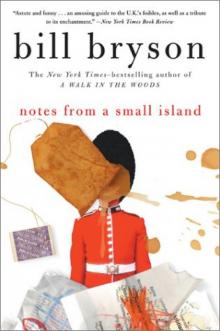 Notes from a Small Island
Notes from a Small Island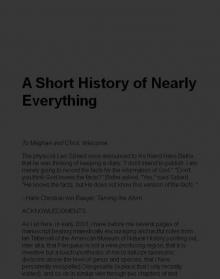 A Short History of Nearly Everything
A Short History of Nearly Everything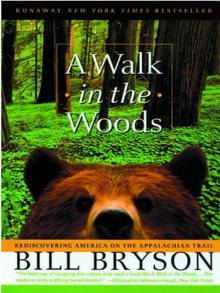 A Walk in the Woods
A Walk in the Woods I'm a Stranger Here Myself
I'm a Stranger Here Myself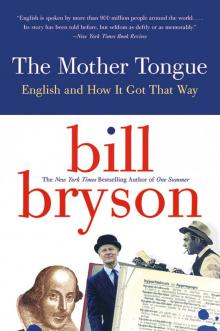 The Mother Tongue
The Mother Tongue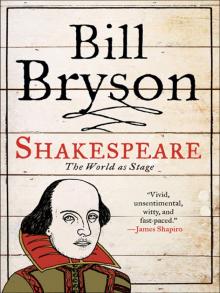 Shakespeare
Shakespeare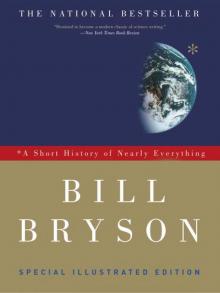 A Short History of Nearly Everything: Special Illustrated Edition
A Short History of Nearly Everything: Special Illustrated Edition The Best American Travel Writing 2016
The Best American Travel Writing 2016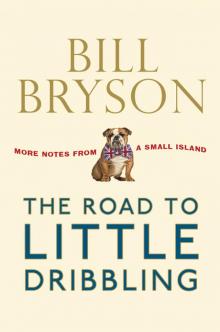 The Road to Little Dribbling
The Road to Little Dribbling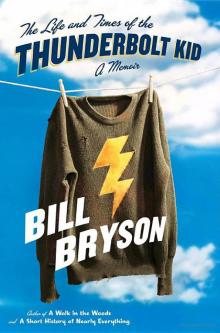 The Life And Times Of The Thunderbolt Kid: A Memoir (v5.0)
The Life And Times Of The Thunderbolt Kid: A Memoir (v5.0) Made In America
Made In America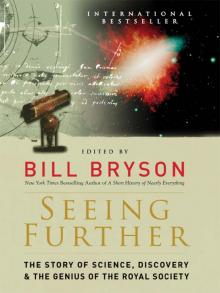 Seeing Further
Seeing Further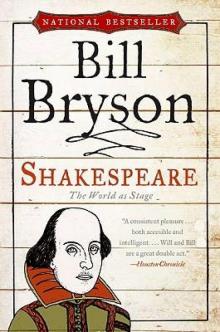 Shakespeare: The World as Stage
Shakespeare: The World as Stage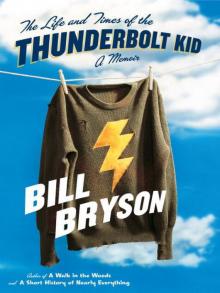 The Life and Times of the Thunderbolt Kid
The Life and Times of the Thunderbolt Kid At Home
At Home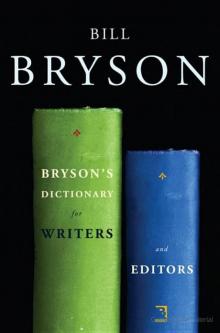 Bryson's Dictionary For Writers And Editors (v5.0)
Bryson's Dictionary For Writers And Editors (v5.0)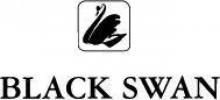 Neither Here Nor There
Neither Here Nor There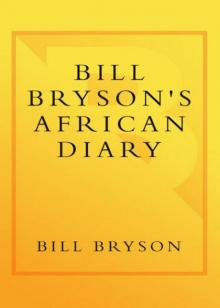 Bill Bryson's African Diary
Bill Bryson's African Diary